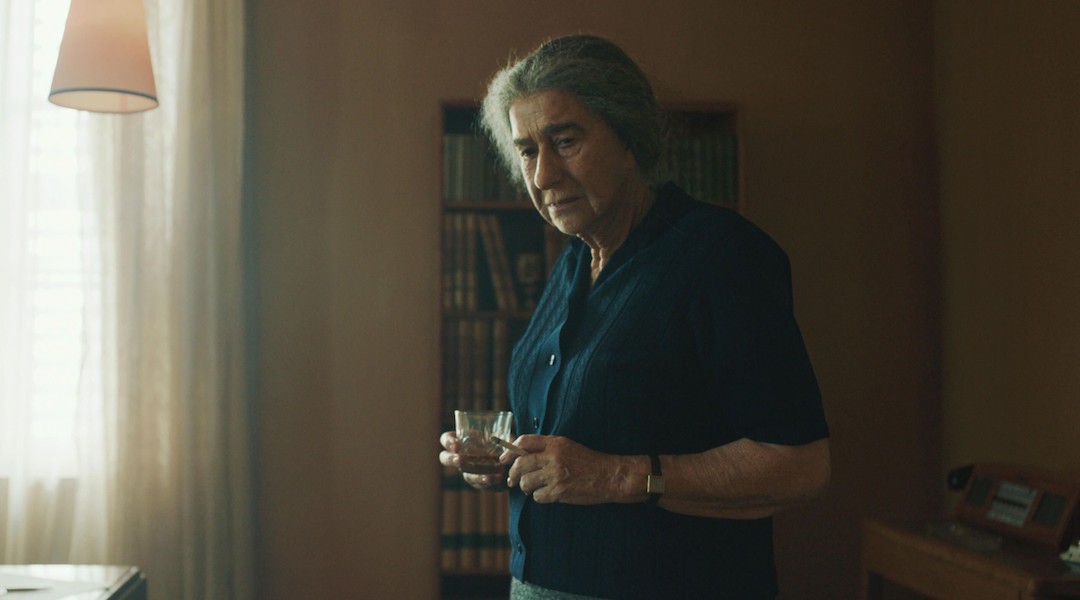Helen Mirren plays Golda Meir in a new film. The two are also (kind of) related.
Mirren was in Jerusalem for the Israeli premiere of ‘Golda,’ the dramatic film she’s headlining about Meir’s handling of the Yom Kippur War

Helen Mirren as Golda Meir in Guy Nattiv’s film ‘Golda.’
JERUSALEM (JTA) — Helen Mirren will soon become linked with Golda Meir in the minds of many viewers when she plays the late Israeli prime minister in a new film. But the award winning actress has another, real-life connection to Meir: the two are related, Israeli genealogical researchers revealed on Thursday.
Mirren was in Jerusalem for the Israeli premiere of “Golda,” the dramatic film she’s headlining about Meir’s handling of the Yom Kippur War — when Egypt, Syria and a coalition of their allies invaded Israel and made significant headway before ultimately being rebuffed.
The movie is headlining the Jerusalem Film Festival, with a red-carpet screening scheduled for Thursday night.
During a press conference before the screening, researchers with MyHeritage presented Mirren with evidence linking her to Meir, who served as prime minister from 1969 to 1974 and remains the only woman to head Israel’s government.
The connection is distant, stretching nine generations back through Mirren’s paternal Russian ancestry, and through marriage only. (The genealogy also connects Mirren to two Israeli presidents, Chaim and Ezer Weizman, and to the British royal family.) Still, Mirren — who is not Jewish — said the revelation offered an important lesson.
“It’s miraculous, isn’t it, really? It just goes to show that we are all one family actually,” she said. “In times of divisiveness and strife as I know Israel is in right now … It would be a very good thing to remember that fact.”
Israel’s political turmoil was a central topic of conversation during the press conference. Mirren and her Israeli collaborators — including director Guy Nattiv and co-star Lior Ashkenazi – reflected on the widespread protests against the right-wing government’s efforts to sap the power of the country’s Supreme Court.
“I am not Israeli. … I’ve watched it from afar these past weeks,” said Mirren, who said at the Berlin premiere of “Golda” in February that she thought Meir would be “utterly horrified” by the current government’s efforts.
“I’m personally moved and excited when I see those huge demonstrations,” she added. “I think maybe it’s a pivotal moment in Israeli history.”
Nattiv said that he had been attending the demonstrations with his father “to stop this crazy thing from happening” and that he had encountered a veteran of the Yom Kippur War who compared the current moment to the existential threat that Israel faced — and overcame — then.
“In a way we are fighting to shape the future of our country,” he said.
The film portrays Meir being caught flat-footed by aggression from neighboring Arab countries, then overseeing a military response that transformed from fumbling to triumphant — and eventually led to Israeli-Egyptian peace in 1979, years after Meir left office. It shows her deeply struggling over the deaths of Israeli soldiers who might have lived had she heeded warnings of war. In 1974, Meir resigned amid divisions within her party over where to assign blame.
“She understood that as the leader of the country she had to take responsibility, and she did — unlike many other leaders who, when things go pear-shaped, start pointing fingers at other people,” Mirren said. “I think that must have been incredibly painful.”
Mirren’s connection to Israel dates back to 1967, when she traveled with a Jewish boyfriend to work for a month on a kibbutz in the country’s north. “I’m amazed every time I come,” she said.
Her casting drew criticism for the decision to have a non-Jewish actress play one of history’s most prominent Jewish women. About the debate over whether roles should be filled by actors whose identities overlap with the characters’, Mirren said, “I adhere to both camps.” She noted that she collaborated closely with the British theater director Peter Cook, who pioneered color-blind acting in the 1970s and died last year at 97.
Nattiv said one of his Israeli colleagues had initially suggested Mirren because of her resemblance to his own grandmother. He said, “I saw the Jewish soul in Helen immediately. We feel like it was the right move.”
Mirren said her motivations for taking the role were simple.
“I’m a horribly greedy actress. All I want to do is play great women,” said Mirren, who won an Oscar for portraying Queen Elizabeth II and has also played Queen Elizabeth I, among other historical figures. “And Golda was one of the greatest.”
Before “Golda” hits screens worldwide next month, Mirren has another major role — as the narrator in “Barbie.” She said both movies offered portrayals of strong women, and suggested a possible addition to the mounting list of promotional tie-ins for the hotly anticipated live-action film about the iconic doll.
She said, “I think we need a Golda Meir Barbie, don’t you think?”
This article originally appeared on JTA.org.
A message from our Publisher & CEO Rachel Fishman Feddersen

I hope you appreciated this article. Before you go, I’d like to ask you to please support the Forward’s award-winning, nonprofit journalism so that we can be prepared for whatever news 2025 brings.
At a time when other newsrooms are closing or cutting back, the Forward has removed its paywall and invested additional resources to report on the ground from Israel and around the U.S. on the impact of the war, rising antisemitism and polarized discourse.
Readers like you make it all possible. Support our work by becoming a Forward Member and connect with our journalism and your community.
— Rachel Fishman Feddersen, Publisher and CEO






















